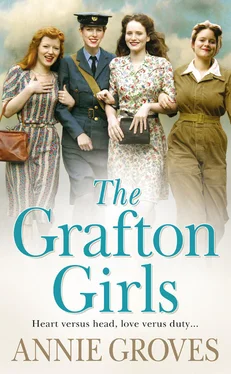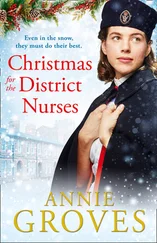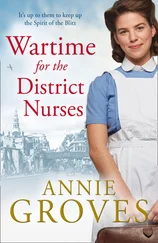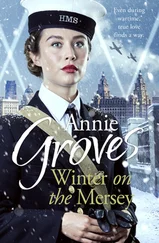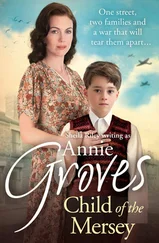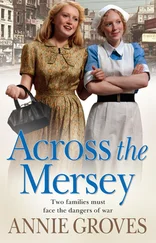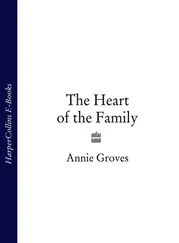‘I know, lass. I’ve heard her crying and calling out when she’s having one of her turns. It’s just as well sometimes that we don’t know what life holds for us. And that’s all the more reason why you should do as I’m telling you. The more you mollycoddle your mam, the worse she’s going to be when you aren’t there. Settles down quite happily wi’ me once I’ve given her a cup of tea wi’ drop of Elsie Fowler’s special home-made elderberry cordial in it. Calms her down no end.’
Ruthie managed to give their neighbour a brief smile, but the last thing she felt like doing was smiling. Was it her imagination or was her mother getting worse? Was she becoming more and more like a small frightened child who could not understand the workings of the adult world? Some days she could be so much like her old self – the self she had been before Ruthie’s father’s death, that Ruthie couldn’t help but feel her hopes lifting that her mother was returning to full normality, but then something would happen, like Ruthie having to do her bit for the war effort, and her mother’s reaction would force her to recognise that her hopes had been in vain.
It was her screaming, sobbing fits of despair that were, for Ruthie, the worst times, when her mother called out again and again for the husband she had lost, like a small child crying for a parent. Ruthie felt so afraid herself sometimes, not just because of the war, but also for the future, after the war. What would become of her mother and herself in that future?
Sometimes Ruthie felt as though that fear was all she was ever going to know of life.
After saying goodbye to Mrs Brown, Ruthie hurried up the front path and unlocked the door. She found her mother sitting in the back parlour, listening to the wireless. The moment she saw her, her mother’s face lit up.
‘I’ve missed you,’ she said.
Immediately Ruthie went over to her and hugged her lovingly. ‘Just let me get my coat off and then I’ll put the kettle on, and then we can settle down and listen to the wireless together,’ she told her.
‘I didn’t know where you’d gone.’
Ruthie’s hands trembled slightly as she filled the kettle when she heard the almost childlike confusion in her mother’s voice.
‘I’ve missed you too, but I had to go to work to help with the war effort,’ she told her gently.
‘Yes,’ her mother agreed. ‘Mary Brown told me. She said I should be proud of you, and I am, Ruthie. I’m very proud of you and I know that your dad would have been as well.’
Only now, hearing her mother refer to her father in the past tense, could Ruthie allow herself to relax a little bit.
‘Mary Brown said that she knew that I’d be pleased that you’d be working with girls of your own age, with there not being many of them living here on the Close. And I am pleased, Ruthie. Pleased and proud.’
‘Oh, Mum,’ Ruthie responded, her voice muffled as she left the kettle to go over to her mother and give her another gentle hug.
‘Shift’s over, girls, thank goodness. My Bill’s back -walked in this morning just as I was walking out.’ Susan stifled a yawn. ‘Said they’d been waiting out over the other side of Liverpool bar for the pilot boats to bring the convoy in for unloading for nearly five hours, on account of them not letting them into the docks until the early hours just in case the ruddy Luftwaffe takes it in their heads to come over and bomb them.’
‘Has he got a decent leave this time, Susan?’ Jean asked.
‘No such luck. Forty-eight hours, that’s all. He should have had more but he’s got “new orders”.’ She paused significantly. All the girls knew better than to ask what those orders might be. All round Derby House notices were pinned up, as they were everywhere throughout the whole country, warning people ‘Walls Have Ears’ and the like. It was strictly forbidden for there to be talk about troop movements, even between close friends and family. ‘But at least he’s home and we can have some time together. Have you got any plans for the rest of the weekend, Diane?’
Diane was grateful to Susan for going out of her way to be friendly towards her, and encouraging the others girls to do the same.
‘Not really,’ she answered her. ‘I’ve promised to go dancing at the Grafton tonight with my fellow billetee.’
‘Who’s that then?’ Jean asked.
‘Myra Stone, one of the teleprinters. You may not know her.’
‘Everyone knows Myra,’ Jean told her drily. ‘She’s got a bit of a reputation for having a sharp tongue and an even sharper eye for the chaps. You want to be careful about how friendly you get with her, Diane. I don’t want to be a gossip but she isn’t very well thought of around here. Has she told you that she’s married?’
Diane took this as a warning and suppressed a small sigh. She really wished that she hadn’t agreed to go out with Myra. She could only spell bad news.
Thank heavens the summer nights, with their extra daylight-saving hours of light, meant that she could walk to and from work every day without having to worry about the blackout, Diane reflected, as she stepped out of the shadow of Derby House and into the warmth of the early evening sunshine. The natural light and fresh air felt wonderful after being underground for so long. Sometimes some of the girls scared one another by coming up with ghoulish stories of what it would be like if the citadel, as it was sometimes nicknamed, was ever bombed and they were trapped inside. Diane didn’t join in these conversations. She had her own nighttime horrors to haunt her.
She looked up at the clear sky, remembering how, in the late summer of 1940, the September skies over the south of England had been speckled with squadrons of RAF fighters, the sound of racing engines all too quickly interspersed with the stomach-churning rat-a-tat-tat of machine-gun fire as the RAF pilots engaged in fierce battles with the Luftwaffe. It was then, shortly after she had first met Kit, that she had started to have terrible nightmares of a blue sky raining blood and destroyed aircraft. She had witnessed at firsthand the devastation caused by the fierce battle fought overhead in the British skies. Twenty-nine British planes had been lost – a terrible toll of young lives, but nowhere near so terrible as the sixty-one planes lost by the Germans. Diane had seen things then she never wanted to see again: the shattered bodies and white lifeless faces of the young men who only hours before she had seen alive and well, familiar to her and yet horribly unfamiliar in their death. When she had confided her bad dreams to a friend, her friend had told her that nearly every woman who worked at the airfield in a supporting role had her own version of the same kind of nightmare.
In the end the RAF had won the battle for England’s skies. Diane knew that the reason that Susan’s young brother had been made up to flight lieutenant was probably because of the number of men that had been lost. Kit had been made up to squadron leader in the space of a few short months that summer. She had been so proud of him, but he had told her bitterly that his promotion had come at the cost of the lives of his friends and comrades.
‘Diane, do you mind if I have a word with you?’
Diane swung round at the sound of Susan’s voice, glad to be brought out of her sombre reverie.
‘Of course not.’
‘I don’t want to be a spoilsport, but if I were you I really wouldn’t get too involved with Myra Stone. It’s bad enough that she behaves as though she isn’t married, but there was a bit of an incident a while back; a silly young newly married chap who fell for her hook, line and sinker. She’d encouraged him, of course, but his poor little wife was heartbroken. The chap was transferred, and Myra got a ticking-off, but these things leave a bad taste in everyone’s mouth and as a result the other girls have tended to give her a bit of a cold shoulder. I appreciate you’re in a bit of a difficult position with the two of you sharing a billet, but I thought I ought to let you know the way things are. For your own sake you might want to consider not getting too pally with her.’
Читать дальше
